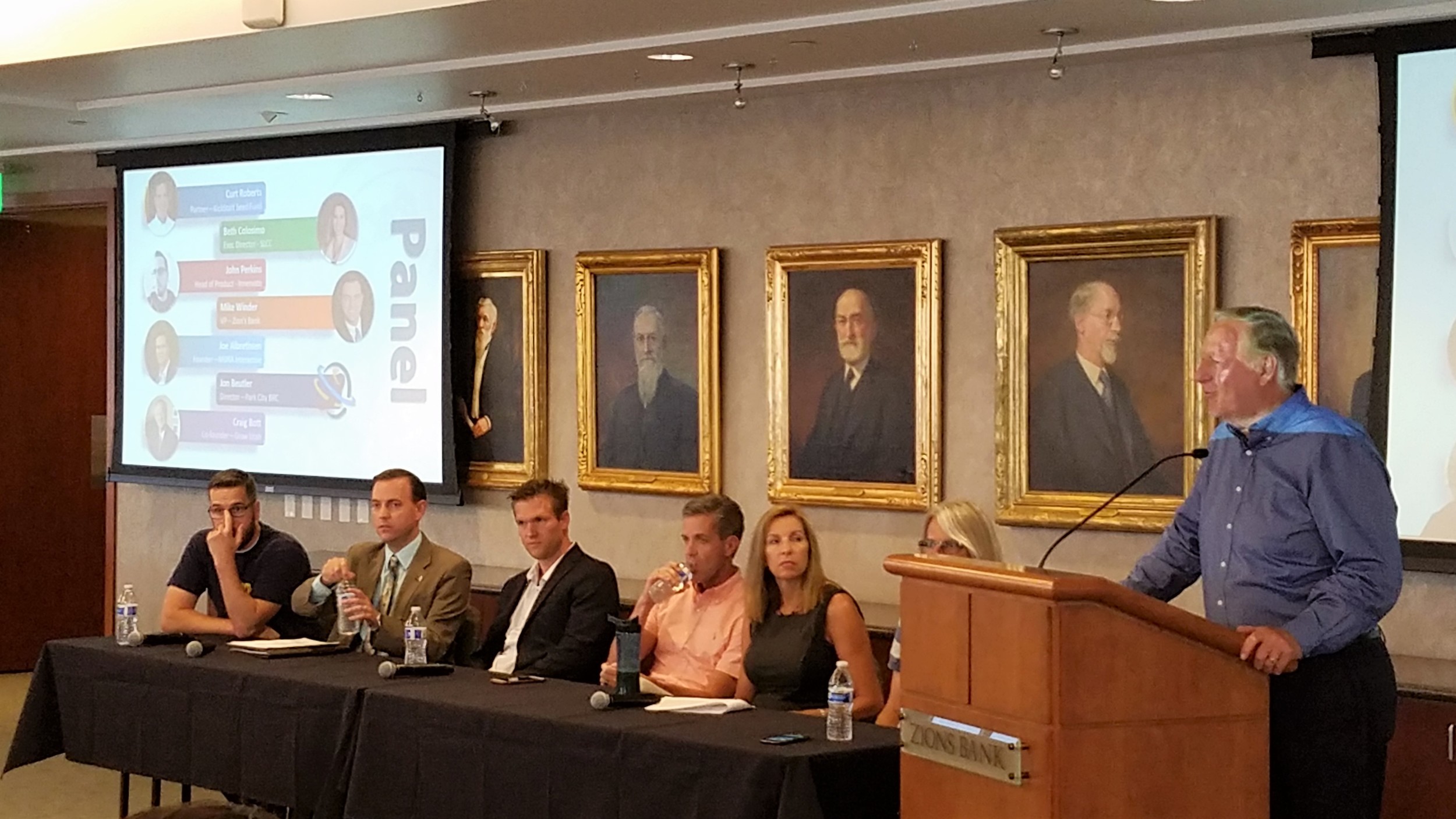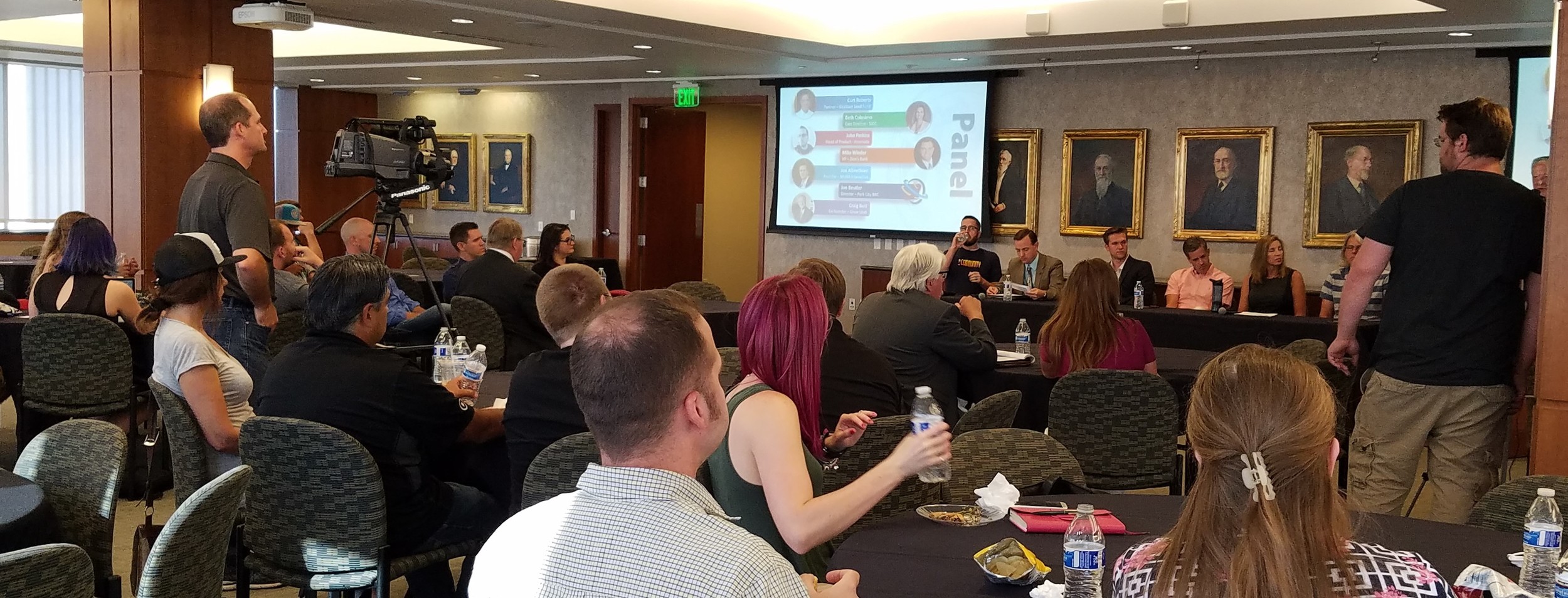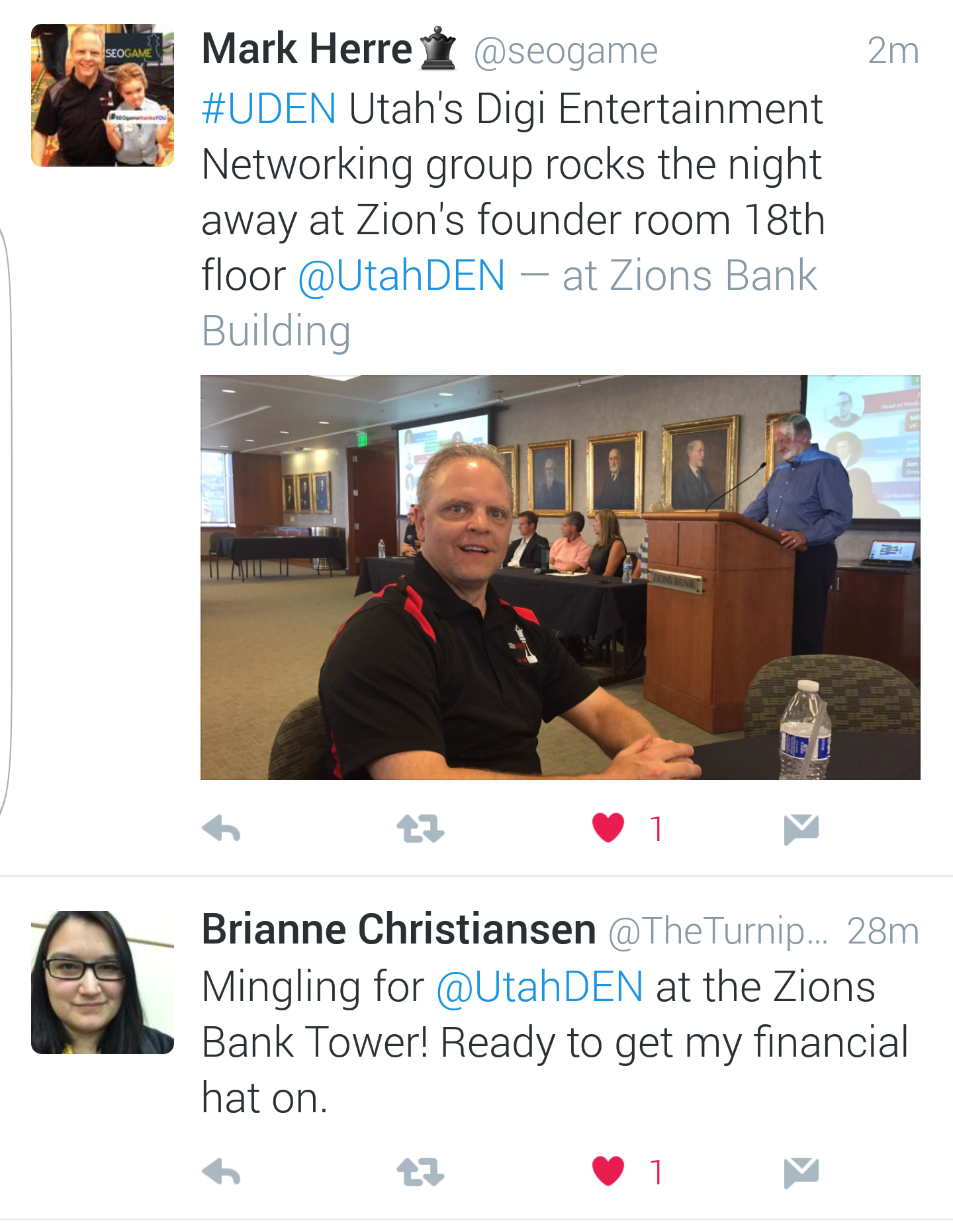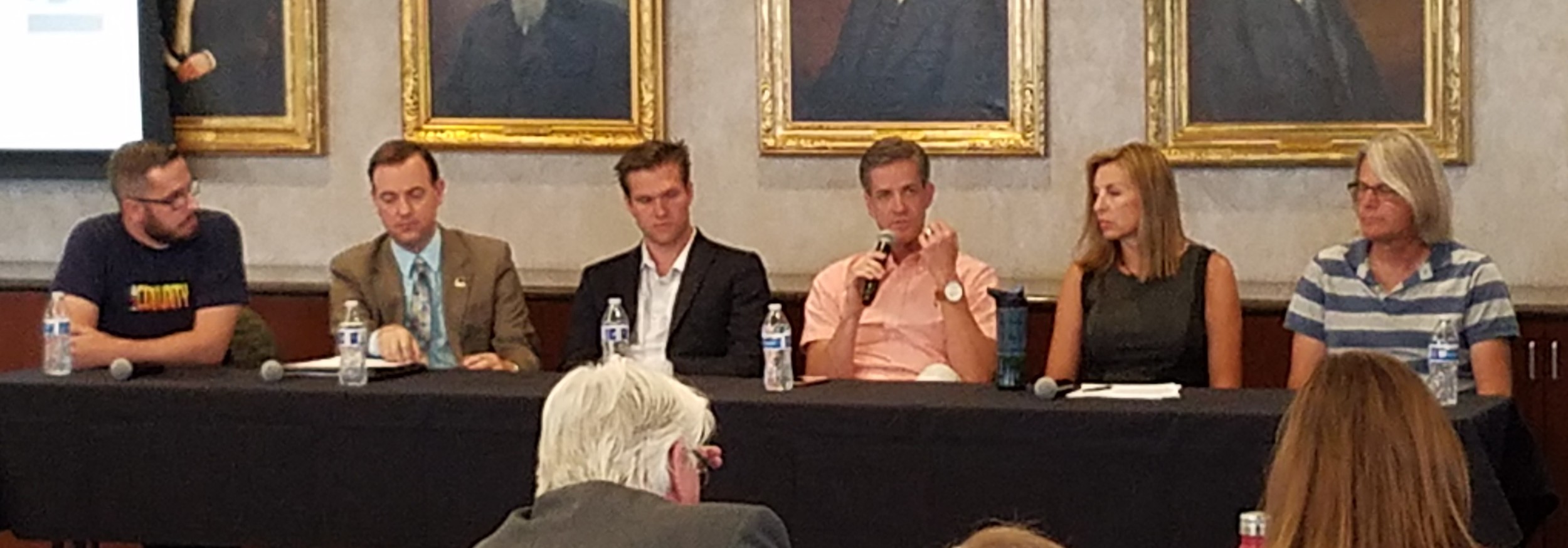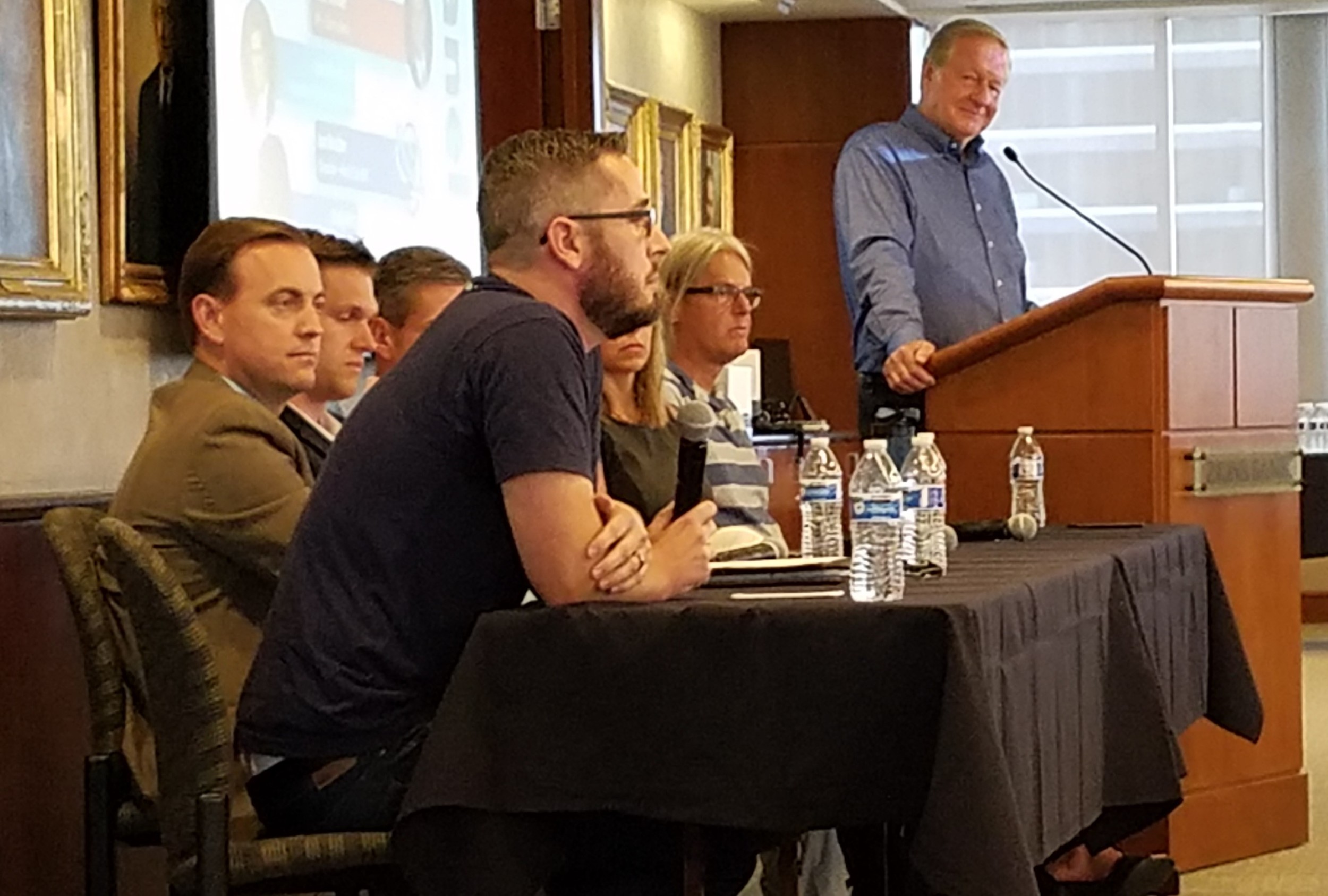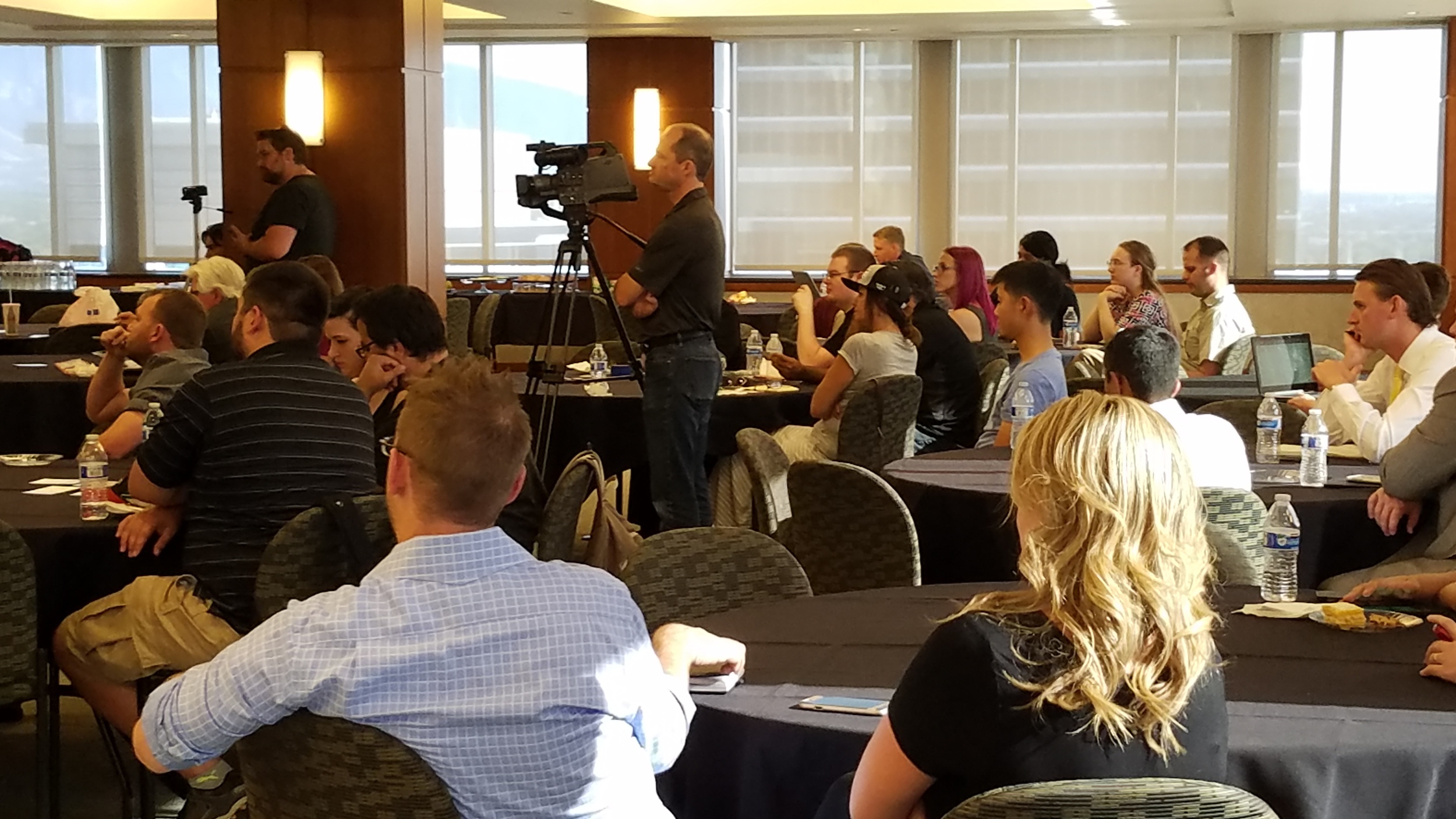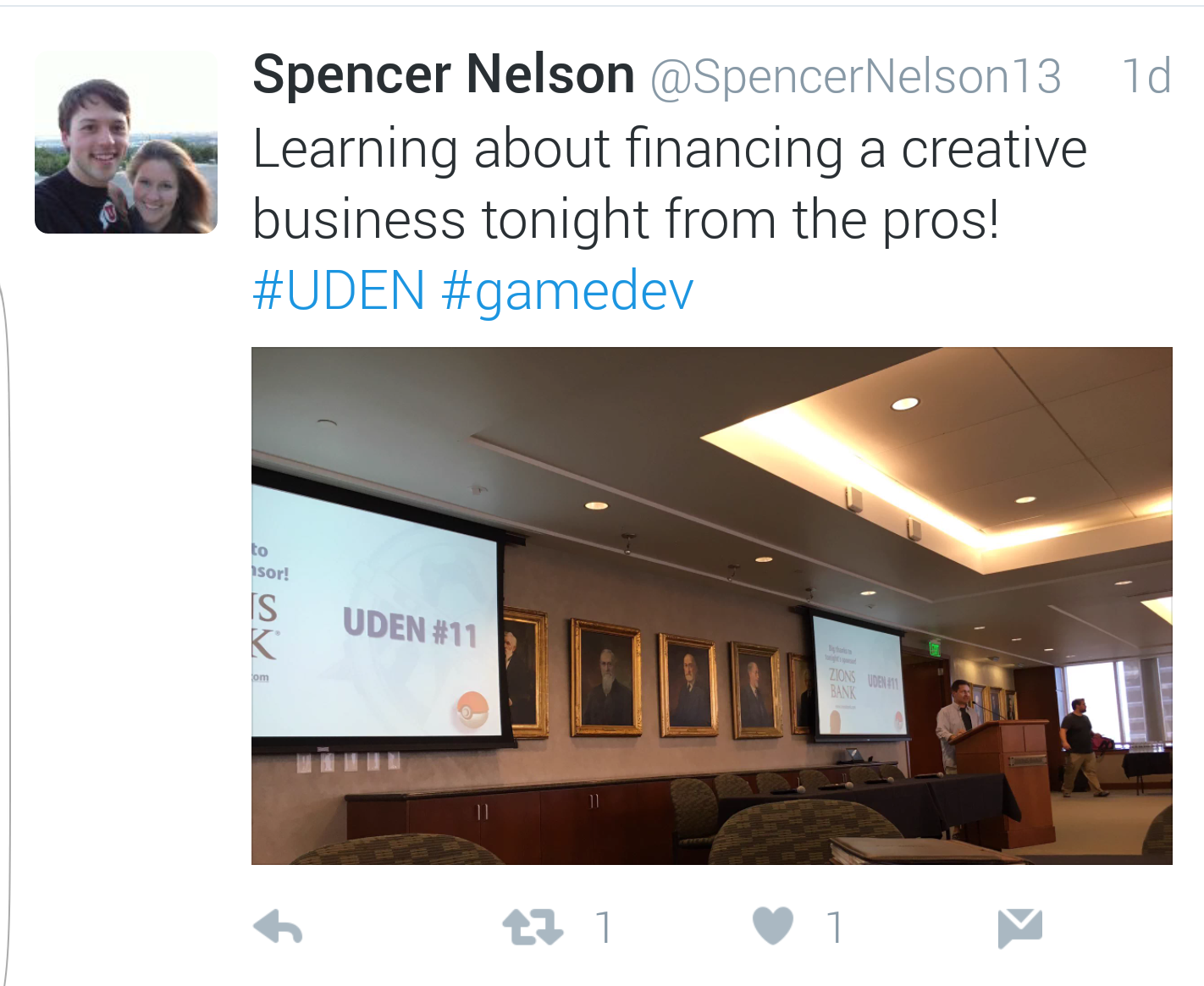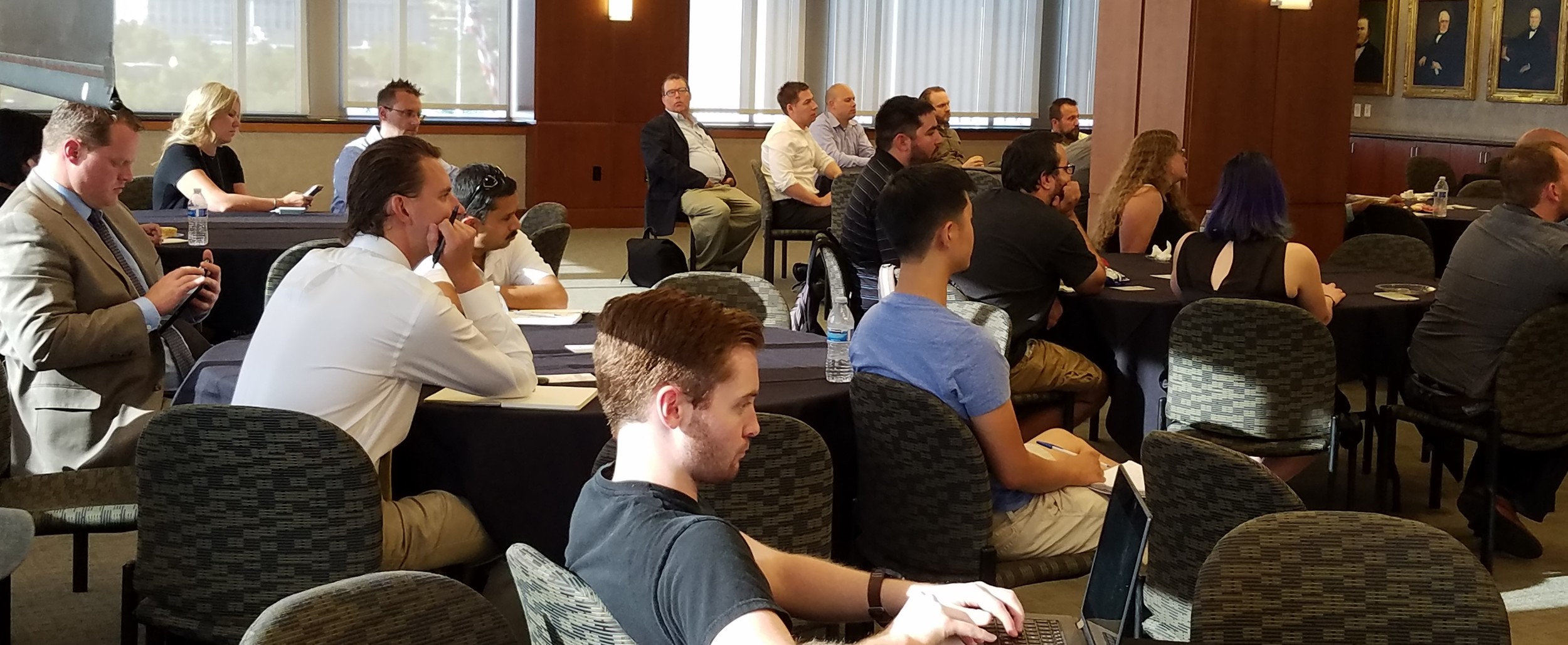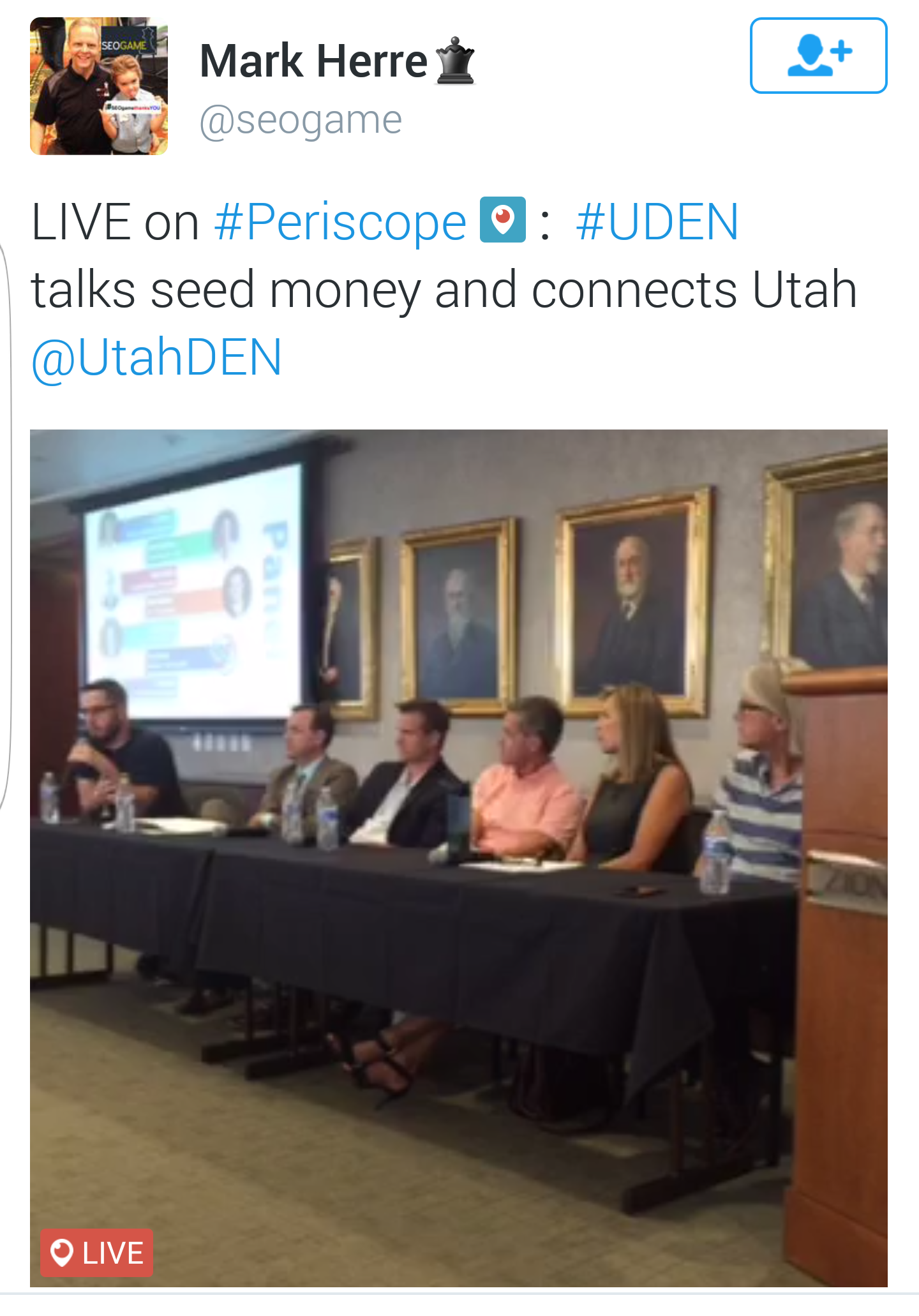It was appropriate that we found ourselves back in the location we held our very first meetings last year - the distinguished Founders Room at the Zion's Bank Tower, downtown Salt Lake City - for tonight's meeting was focused on financing a creative business - the processes and the challenges.
An expert panel, expertly chaired by Craig Bott, brought with them different levels of experience to the topic; some provide funding, some help businesses to apply for funding and others have recently successfully funded their entertainment business. After a short introduction, Craig asked the panelists to ponder some specific questions and then the discussion was opened to the floor.
There were some very interesting take-aways -- of course, much of the information shared could apply to almost any business, and, of course, we were keen to understand more about funding a creative business:-
- Entertainment products, such as films and games, tend to be higher risk ventures for investors as they are hit-driven businesses and it is often hard to demonstrate repeatable revenue. Just making a hit movie or game that gets a paying audience is hard enough; repeating that success is harder still. Investors are looking for businesses with repeatable revenues.
- There wasn't a great deal of discussion about funding film projects; the sentiment seemed to be that these are harder to fund as they typically have a production company setup as the investment vehicle, as opposed to a business. There are investors who fund films, very few in Utah. Possible to get funding but quite specialist
- When asked what we creators can do to improve our chances of getting investment from the investment community, it came down to a few key things, including:
- being prepared (see below);
- doing your homework (know your business, needs etc - see below);
- getting as much done as you can before asking for investment;
- know that investment takes time; "twice as long as you expect" was one quote from the evening. Be ready to meet with target investors periodically, knowing that each time they'll be looking to see if things are still going the way you said they would the last time you met
- be "out there" - attend trade shows, get to know potential clients, take as much advice from experts as you can especially in areas that are not your specialty
- Know how much you need to borrow
- However you get funding, you'll need to have done a thorough planning exercise to know how much you'll need, and importantly, what it is for;
- These are important because (a) any financier will expect you to have a good plan and show them you are serious and (b) there are different types of financing available for different needs - for example, there are specific types of financing for equipment, others for collecting monies owed from clients
- Don't plan to raise all of the money at once; it is often easier to raise smaller amounts of money, so think about raising finance in stages. You are likely to get moving faster, keep more of your company equity and reduce risk for your business and future investors with this approach.
- For example, at first maybe all you need to fund is the creation of a prototype -- with that, you'll have a more tangible expression of your business opportunity, and so making raising subsequent funds easier.
- When you first startup, your costs (and so finance needs) are likely to be smaller than when the business is in full swing.
- In some cases bank loans or loans from family and friends might cover these amounts.
- Grants may be available from local authorities or companies.
- Asking founders to work for less money, or even for free for a period of time helps reduce financing need in return for a percentage ownership in the venture (sweat equity)
- Then perhaps you need to take on some people, or buy some equipment, to move from prototype to an actual product.
- You'll probably need a larger investment for this and will likely want to find an investor, who will take equity in the company in return for providing finance for this next phase.
- Startup (or seed) funding is often handled by smaller investors to help businesses get started, often these are called 'Angel' investors
- Other options to consider include some kind of strategic partnership, where a potential client might be willing to fund this next stage in return for an exclusive for a period of time when the product is ready
- Once you have a product and are generating revenues, then perhaps you need money to grow the business.
- Larger investments tend to be handled by venture capital investors. They help companies that already operate move to the next stage of growth
- Other options include your existing investors (such as your original angels or family members, who might be willing to invest further), or clients who might be interested in investing in your company
- For example, at first maybe all you need to fund is the creation of a prototype -- with that, you'll have a more tangible expression of your business opportunity, and so making raising subsequent funds easier.
- Be as creative thinking about funding options as you are with your creative product; maybe you don't need an investor!
- Our panelists discussed a variety of different methods, including:
- traditional - credit cards, lines of credit at the bank, bank loans etc
- competitions - enter tech or creative contests to win prize money and services
- kickstarter/crowdfunding etc
- grants - look for small business grants, enterprise schemes, awards from large companies etc
- Incubators - access to free or low-cost facilities and services
- Our panelists discussed a variety of different methods, including:
- When pitching anyone for money, be prepared
- Investors of any kind tend to back people and passion more than product - they need to believe in you, so be ready;
- They will want to see evidence of good planning - a business plan including your financial plan, marketing plan, distribution plan, production plan & timelines, company structure (type, ownership of shares etc)
- In addition to seeing your planning, investors will ask questions to both understand your product and your business -- eg what will you do with the money? How did you figure out how much you need? How much have you personally invested? What other sources of financing do you have? What debt do you have? What sales do you have? What experience do you have in this market? What experience do you have in creating and managing products like the one you're making? What happens if things don't come together as you expect? Who is the audience for the product? How have you determined that they will be interested in this product? What will the investor get in return for their investment and how long will that take?
- The investors on the panel also stressed that confidence in your team is as important as confidence in you - together it should provide credibility;
- Who are your business partners?
- What is their experience?
- How committed are they?
- What advisers do you have?
It was another really excellent evening with a super interesting panel discussion and audience interaction. An hour of socializing followed and once again it was great to see so much interaction and networking occurring. A video of the event will follow at our YouTube page and don't forget to checkout the new resources page on the UDEN website, which captures a lot of this information in more detail.
Special shout-out also to Jeff Peters and AJ Dimick for their help organizing these events, setting up, filming and then editing the videos for our events!
If there are any take-aways that I missed, please feel free to add them below!
“The Panel:
CURT ROBERTS, Partner, Kick Start Seed Fund
Curt is a seasoned operating executive with experience from start-ups through Fortune 100 companies, such as Nike, where he was Vice President of Global Strategy. Curt’s team, together with the iPod team at Apple, ideated, developed and launched Nike Plus, the company’s initiative to bridge the world between sports and the digital experience. Curt has been an active angel investor and board member for several Utah-based start-ups and now at Kickstart, Curt has served on the investment committee since 2011, joining the team full-time as a venture partner in 2015.
BETH COLOSIMO, Executive Director Business Development Resources Salt Lake Community College
Beth oversees various small business programs including the Business Resource Center, the Innovation Center (Incubator), the Conference Center, the Export Assistance office, the refugee leadership training program, as well as the Small Business Development Center and Goldman Sachs 10,000 Small Businesses program.
JOHN PERKINS, Head of Product, Innervate
Innervate, an SAAS based service designed to help gaming companies create on-line communities, is a recent Tech Stars graduate from the Seattle cohort. An entrepreneur at heart, John is a well-rounded collaborator and problem solver who has experience managing teams, developing business models and raising capital.
MIKE WINDER, Vice President of Community Relations and Director of Entrepreneurship Programs, Zions Bank
During Mike's career, he has been a business development manager, a City Council member, and mayor of West Valley City, Utah's second-largest city. He has been vice president of Marketing for Winder Farms, director of Public Affairs for Summit Group Communications, and executive director of a national Super PAC, Friends of Traditional Banking.
JOE ALBRETHSEN, Founder, MURA Interactive
MURA is a Utah start up that has recently expanded internationally with the help of key strategic partners. MURA created DubWars, an innovative, multiple award-winning game that takes your love of music and combines it with the simple mechanics of a top-down shooter; capturing the intensity, anticipation and insanity of Dubstep! Your weapons are synced to the music and fire to the beat. Each level is custom built to bring a new fun and exciting experience.
JON BEUTLER, Alumni Manager, Salt Lake Community College
With over 25 years experience in business development, marketing, and project management, Jon Beutler has managed all phases of corporate operations. As an entrepreneur, Jon has extensive experience in technology start-ups, as well as new product development for existing companies. Currently as the Director of the Park City Business Resource Center, Jon engages with small businesses and entrepreneurs to develop growth opportunities through capital acquisitions and business plans, and conducts one-on-one mentoring sessions.
CRAIG BOTT, Co-founder, President and CEO, Grow Utah
Over an impressive career, Craig has launched and managed five of his own companies in the fields of software technology, consumer electronics, digital media, broadband services and professional services. He has helped numerous businesses raise angel and venture capital, design product and operational strategies and implement successful marketing and sales campaigns.
Craig directly mentors and advises numerous early stage companies, is an author on a variety of topics related to entrepreneurship and is a frequent speaker on the topic of entrepreneurial development and industry acceleration. Craig has provided senior level management advice and council on strategy, marketing and management to hundreds of emerging and expanding businesses throughout the western United States. He has served in a variety of senior operational positions at such companies as Franklin Covey, MarketStar as well as the Utah Governor’s Office.




